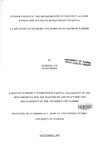| dc.description.abstract | This research is an exploratory study that sought to examine the social, economic,
cultural, political and legal determinants of violence against women. It further sought to
find out factors that impede women's access to and enjoyment of their human rights in
the slum areas of Nairobi.
The study was conducted in Mathare and Korogocho slums of Nairobi. Particular
attention was given to what causes violence against women; the impact of violence
against women at the household with a view to interrogating how violence tear the socioeconomic
fabric of the families in these slums.
The study population included the women at household level as the primary source of
data to provide information on the type, consequences and the impact of violence in their
lives and their families' wellbeing. The study also targeted those who have individually
suffered and survived the violence and who gave first hand information on their suffering
at the hands of the perpetrators, what they did as deterrence to being violated further.
Further, caregivers provided crucial data on some of the cases in their areas and why they
feel violence increases. They gave account of government attempts at eliminating
incidences of women violation and some of the difficulties that these efforts encounter.
Ministry of Gender, Sports, Culture and Social Services; National Commission on
Gender and Development; Federation of women Lawyers in Kenya; Coalition on
violence against Women; Centre for Rights Awareness and Education; CCGD; IC]; LSK;
CAUCUS; YWLI; and Groots- Kenya provided data on what interventions they are
making in an effort to eliminate the incidences and impact of violence against women in
Kenya. Further data was obtained from Kenyatta National Hospital; Nairobi Women's
Hospital; City Council Dispensary-Dandora; City Council Dispensary-Huruma; St.
Teresa Hospital in Mathare and St. Pius Health Clinic-Korogocho on the records of daily
violence related admissions and treatments. Eight focused group discussions were
organized, four in each slums to find out what they thought would be the best ways to
deal with violence against women in these slums.
The study revealed the women are aware about the fact that their rights are being violated
and that majority of the perpetrators are their husbands. Most incidences of violence
occur due to patriarchal tendencies in the African societies, which fuel the believe tat
women must be disciplined. Other factors revealed in the study include substance abuse,
alcohols and poverty. The study further showed that government efforts to cub violence
against women exist in the slums, albeit, with myriad weaknesses. Records showed that
many women having reported to police, but the legal systems and poverty among women
curtail the speedy conclusion of cases while other women choose to withdraw cases
owing to fear of being ostracized by the family male members.
The study also revealed that there is lack of a national structure and system to fights the
increased women's right's violation. These efforts are also incongruent with interventions
by civil society organizations (CSOs). The government has failed to domesticate
pertinent articles in the Convention on the Elimination of All Forms of Discrimination
Against Women (CEDAW) that she ratified in 1984. This means that legal provisions
remain weak in deterring men from perpetrating violence against women.
In conclusion, the study confirms that numerous socio-cultural and legal factors
contribute to increased incidences of women's rights violation. Sex stereotypes, coupled
with patriarchal institutions in the society entrench violence at the household level.
Culture influences male oppression over females and therefore leads to denial of
women's access to and enjoyment of their rights.
Recommendations and way forward is that constitutional amendments be made to
remove all gender based discriminatory provisions and to reflect sensitivity towards
women and women's rights. Women should be treated with equal dignity in all spheres of
life. Cultural practices that undermine the dignity, welfare, interests and the status of
women should be prohibited through a strong national policy framework that define and
spell out the women's rights, provide for stiffer penalties to perpetrators and provide for
education and information dissemination to the public through a national campaign
Programme that is targeted at eliminating negative imaging of women through media.
Lastly, a strong synergy should be created between the Government's and Civil Society
Organization interventions to enable adequate resources to be mobilized for setting up
national machinery to tackle violence against women once and for all. | en |

